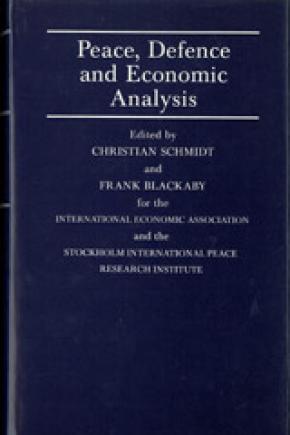Peace, Defence and Economic Analysis
The economic analysis of peace and defence and of arms industries and military expenditures is rapidly developing into an important area and topic of study for economists. The International Economic Association debated it first in 1982 and also at its World Congress in 1983. This is the volume of the proceedings of a conference which took the subject further. In part the book covers theoretical, econometric and mathematical models which lay foundations for a better understanding of the dynamics of arms races and threats to peace. But it also deals with the macroeconomic factors—which are the background to defence—with the economic analysis of vital non-economic factors and with the history of the subject in economic thought. Finally, it also presents some views on the analysis of military activity at the level of the firm.
Part I. General perspectives
1. Unilateral national defence organisations: An economic analysis of non-economic structures
Kenneth E. Boulding
2. Peace and war economics in retrospect: Some reflections on the historical background of defence economics
Christian Schmidt
3. Defence spending as a priority
Andrew Brody
Comment
Amartya Sen
Part II. Defence and war modelling
4. The uses, values and limitations of game theoretic methods in defence analysis
M. Shubik
5. Conflict, arms races and war: A synthetic approach
Jean Christian Lambelet and Urs Luterbacher
6. Arms races and the outbreak of war: Application of principal-agent relationships and asymmetric information
Dagobert L. Brito and Michael D. Intriligator
Comment
Walter Isard
7. Economic considerations in the comparison between assured destruction and assured survival
Martin C. McGuire
Comment
Kurt Rothshchild
8. Economic warfare between the superpowers
Murray Wolfson and John P. Farrell
Part III. Macroeconomics in an international political framework
9. Economic change as a cause of international conflict
Bruce Russett
10. Whither modernisation and militarisation, implications for international security and arms control
Edward A. Kolodziej
11. The current warfare/welfare alternative and the evidence from technology
Ulrich Albrecht
12. Military expenditure comparisons
Hans Christian Cars and Jacques Fontanel
13. The economics of military spending: Is the military dollar really different?
G. Adams and D. A. Gold
Comment
Christos Passadeos
14. Military-related debt in non-oil developing countries 1972–82
Rita McWilliams Tullberg
Comment
Victor L. Urquidi
Part IV. Econometrics and applied microeconomics
15. Military expenditure dynamics and a world model
A. R. Gigengack, H. de Haan and C. J. Jepma
16. Time-series estimates of the microeconomic impact of defence spending in France and the UK
Stephen Martin, Ron P. Smith and Jacques Fontanel
Comment
H. de Haan
17. NATO burden-sharing: Rules or reality?
Todd Sandler
18. Defence and employment in the UK and France: A comparative study of the existing results
Jacques Aben and Ron P. Smith
19. Reducing defence expenditure: A public choice analysis and a case study of the UK
Keith Hartley
20. The conversion of military activities: A strategic management of the firm perspective
Pierre Dussauge


